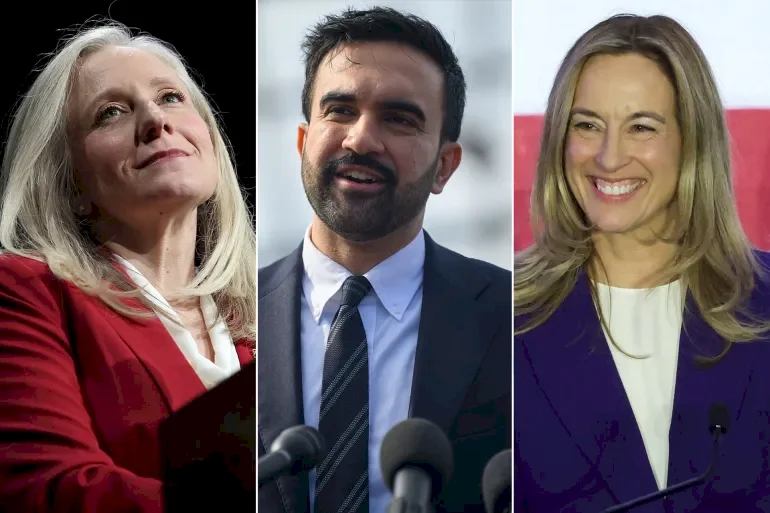
The Secret of the "Appealing Populism" that Mamdani Leveraged to Secure New York
SadaNews - A discussion conducted by The New York Times featured prominent political analysts, Frank Bruni, Sarah Anderson, and Nate Silver, outlining the American political landscape after the recent elections in New York City, as well as in New Jersey and Virginia, with a particular focus on President Donald Trump's standing within the Republican Party.
The dialogue also addressed the ongoing debate within the Democratic Party between the progressive wing led by new figures like New York's new mayor, Zehran Mamdani, and the centrist wing represented by figures like Abigail Spanberger and Mikie Sherrill, who won the governorships of Virginia and New Jersey in the recent elections for U.S. governors.
The discussion begins with a sarcastic remark from Bruni about some Republican politicians attempting to emulate Trump in his populist behavior, such as appearing in fast-food restaurants to woo ordinary voters.
Trump Is Not to Be Imitated
Sarah Anderson believes these attempts are unsuccessful because "Trump is not to be imitated"; he possesses a unique ability to appeal to the cultural and political instincts of working-class white voters.
However, Anderson pointed out that the essence of his success lies not in populist theatrics but rather in the promise he offers voters that they will be able to live safely and affordably, which should be the focus of any politician seeking their trust.
Bruni then transitions to discussing the election results in New York, where Mamdani won the mayoral position, becoming the first Muslim and the youngest person to hold this position in over a century.
Bruni poses a question about the model the Democratic Party should adopt at the federal level: is it the progressive model represented by Mamdani, or the centrist model embodied by moderate figures like Spanberger and Sherrill?
Nate Silver: Mamdani has managed to overcome extensive biases in a politically and ethnically diverse city, even though parts of it leaned towards Trump in the 2024 elections.
Appealing Populism
Anderson responds that Republicans mock Mamdani's rise and predict that adopting his approach will lead to a decline for Democrats. However, she warns against underestimating him; he possesses a remarkable rhetorical ability and excels in what she calls "appealing populism," which combines charisma with direct engagement with people.
She observes that voters, especially those Trump tried to win over, have become more willing to overlook extreme political positions if they feel the candidate is capable of delivering tangible results.
Nate Silver adds that he is impressed with Mamdani's political skills, as he has managed to overcome broad biases in a politically and ethnically diverse city, despite parts of it leaning towards Trump in the 2024 elections.
Silver notes that polls have shown that many Americans are still hesitant to elect Muslim candidates, which makes Mamdani's victory a significant achievement. However, he also points out that former Governor Andrew Cuomo's campaign was very weak and contributed to Mamdani's rise.
Silver believes that empirical data clearly indicates that centrist candidates tend to perform better electorally overall, as long as conditions are equal.
Unlike Kamala Harris
He adds that having a progressive wing within the party is not necessarily a negative thing, provided it is represented by smart and young faces like Mamdani, who is capable of interacting with public opinion and candidly adjusting his previous positions, unlike former presidential candidate Kamala Harris, who struggled to convince voters of the genuineness of her political transformations.
Bruni believes that Democrats will not fully embrace Mamdani's model, but they will realize the importance of the energy and dynamism he represents, along with the need for candidates who possess charisma and a strong media presence, especially in an era dominated by social media.
He warns that the Democratic Party, despite its recent successes, may reach incorrect conclusions leading to strategic errors, pointing to a series of catastrophic decisions made by Democrats in past years due to a misreading of electoral results.
The Danger of Overconfidence
Silver agrees that there is a risk of overconfidence, as witnessed after the 2022 midterm elections when Democrats performed better than expected, leading them to believe that former President Joe Biden's performance was sufficient for a second term, halting discussions about renewing leadership.
He asserts that he prefers to have competitive primaries within the party because Democratic voters, contrary to popular belief, act with relative rationality and consider "electability" as much as they do ideological issues.
Anderson notes that while the Democratic base tends to lean left compared to centrist voters, it still remains more disciplined than the Republican base, which allowed for the rise of extreme candidates during the so-called "Tea Party" era, costing many electoral opportunities.
Both Parties Face a Tough Test
She adds that the most engaged voters in the Democratic primaries are the same ones who supported Joe Biden in 2020, indicating that they still lean towards pragmatism rather than ideological extremism.
The discussion concludes that both American parties face a tough test: Republicans are looking for an alternative that matches Trump's popular influence without replicating his political chaos, while Democrats are trying to balance the allure of new faces from the progressive wing with the demands of electoral realism.
Amidst this, it appears that American democracy is entering a phase of redefining its discourse and leadership figures, in a time where the rules of political communication and social alignment are changing at an unprecedented pace.
Source: The New York Times

High-level sources reveal to SadaNews: Washington seeks to hold a Gaza Reconstruction Conf...

Sources to 'SadaNews': 'Hamas' Prepares to Announce New Head of Its Political Bureau

The Largest Since the Iraq Invasion: Washington Continues to Strengthen Its Military Prese...

Americans Ask: Does Huckabee Represent Washington's Interests or Those of Tel Aviv?

Global Newspapers: Sewage Crisis on American Aircraft Carrier and Its Sailors Want to Resi...

مصر وتركيا.. "التحالف الإسلامي" الذي تخشاه إسرائيل

Sheikh Sends Message to Mladenov Announcing the Establishment of a Liaison Office Headed b...

